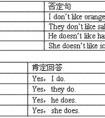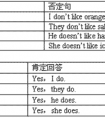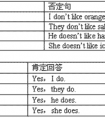动词填空 。1. Someone _____________ (knock) at the door, go and see who it is.2. It is unnecessary for you _______________ (take) an umbrella every day.3. _-八年级英语
| 规则 | 动词原形 | 第三人称 单数形式 | |
| s | 一般在词尾加s(读音规则: 清清浊浊元浊, 在清辅音后读清辅音/s/, 在浊辅音和元音后读/z/) |
stop take clean play grow |
stops/s/ takes/s/ cleans/z/ plays/z/ grows/z/ |
| es | 以,x,ch,sh,或o结尾的动词 加-es(读/iz/) |
pass fix wash watch do |
passes fixes washes watches does |
| ies | 以辅音字母 加y结尾的动词,变y为ies(读/iz/) |
fly carry hurry |
flies carries hurries |
注意:不规则变化的有have—has, be—is, go—goes, do—does
一般现在时,当主语是第三人称单数时,谓语动词要用第三人称单数形式
主语是第三人称单数有以下几种情况:
(1) 不可数名词做主语:
Some water is in the glass
(2) 单个的可数名词做主语:
The girl is Chinese. My watch is on the dresser.
(3) He ,she , it 等代词单个做主语:
He is in the tree. She likes her family very much.
(4) 单个的人名,地名或称呼作主语:
Mary is a doctor. Uncle Li speaks a little English.
Changchun is a beautiful city.
(5) 指示代词this, that 等作主语:
This is a pear. That is an apple .
(6) Everyone, everything ,something, nobody, nothing.等不定代词作主语时
Is everyone here today? Everything is ok .
(7)单个数字作主语时:
”8” is a good number in China.
动词单数第三人称形式的一般现在时的句子的否定句、疑问句及特殊疑问句。 <?xml:namespace prefix = "o" ns = "urn:schemas-microsoft-com:office:office" />
否定句:
在主语的后面实义动词前加doesn’t(注意实义动词应恢复原形。)
主语(单三)+doesn’ + 动词原形+其他
Jim likes football变否定: Jim doesn’t like football
He has lunch at school. 变否定:He doesn’t have lunch at school.
一般疑问句及答语,在句子前面加助动词does. 实义动词恢复原形
Does +主语(单三)+ 动词原形+其他
Does your father work ? Yes, he does. /No, he doesn’t
特殊疑问句:特殊疑问词+一般疑问句
特殊疑问词+ does +主语(单三)+ 动词原形+其他
Where does a bird live ?
How does she go to school?
考点名称:不定式
- 动词不定式:
指由to加上动词原形(而且只能是动词原形)所构成的一种非限定性动词,但在有些情况下to可以省略。
动词不定式在语法功能上可作主语、宾语、宾语补足语、表语、定语和状语。 - 动词不定式可以作以上各种成分,但它毕竟是动词,所以有动词的属性。
动词不定式及其短语还可以有自己的宾语、状语,虽然动词不定式在语法上没有表面上的直接主语,但它表达的意义是动作,这一动作一定由使动者发出。
这一使动者我们称之为逻辑主语,其形式如下:
时态 主动形式 被动形式 一般式 (not) to do (not) to be done 完成式 (not) to have done (not) to have been done 进行式 (not) to be doing 完成进行式 (not) to have been doing - 不定式的用法:
1、不定式作主语
例如:To remember this is very important.
注意:为了避免头重脚轻,在许多情况下,通常都将作主语的不定式置于句子后部,而在句首主语位置使用形式主语it。
例如:It is very important to remember this.
2、不定式作表语
例如:He seems to be ill.
注意:不定式作表语主要有三种情况,一是用于seem, appear, prove等系动词之后的不 定式(尤其是to be),
二是像My job is to sweep the floor. 这样的主语与表语“等价”的情形,
三是表示想法、约定、义务、命令、可能性、命运等,如:
You are to come when I call.
3、不定式作宾语
例如:I can not afford to buy a car.
注意:
①不定式不仅用作动词的宾语,还可用作个别介词(but, except)的宾语。
例如:I had no choice but to wait.
②当作宾语的不定式后跟有宾语补足语时,通常要用形式宾语it代替不定式,并将真正的宾语不定式置于宾语补足语之后
例如:I find it difficult to learn Japanese well.
4、不定式作宾语补足语
例如:Who taught you to drive?
5、不定式作定语
例如:I have a question to ask you.
注意:有的名词(如way, chance, right等)后用作不定式可换成of doing sth.
如:It is the best way to do (of doing) it.
但是以下名词后接不定式作定语时通常不能换成of doing sth.
attempt courage decision effort fortune failure invitation wish
- 最新内容
- 相关内容
- 网友推荐
- 图文推荐
| [家长教育] 孩子为什么会和父母感情疏离? (2019-07-14) |
| [教师分享] 给远方姐姐的一封信 (2018-11-07) |
| [教师分享] 伸缩门 (2018-11-07) |
| [教师分享] 回家乡 (2018-11-07) |
| [教师分享] 是风味也是人间 (2018-11-07) |
| [教师分享] 一句格言的启示 (2018-11-07) |
| [教师分享] 无规矩不成方圆 (2018-11-07) |
| [教师分享] 第十届全国教育名家论坛有感(二) (2018-11-07) |
| [教师分享] 贪玩的小狗 (2018-11-07) |
| [教师分享] 未命名文章 (2018-11-07) |






